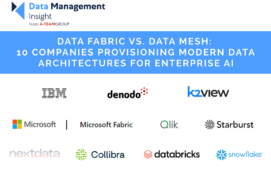When it comes to the rather “unsexy” problem of tackling a firm’s master data challenges and ensuring that as much point to point architecture has been eliminated as possible, there is nothing better than a master data management (MDM) warehouse, said Shannon Walker, business architect for Finance Change at Deutsche Bank, to delegates at this month’s TSAM. Walker, who prior to her role at Deutsche was also a data architect at Aviva Investors and Citigroup, discussed her current firm’s decision to establish three golden sources for its master data in order for it to be exposed to scrutiny by analysts in a centralised manner.
The reason behind the decision to have three golden sources (as opposed to just one) was driven by downstream user requirements, said Walker. On this note, at last year’s TSAM, she spoke about the need to involve downstream users from the business in data management projects in order to ensure they are on board with the changes, which she again reiterated this year. Building consensus for the launch of a project is easier from the grassroots level of those that have to deal with the data on a daily basis because they appreciate the challenges involved, she said. Hence the decision to support these downstream requirements with three specifically formatted golden sources; one size does not fit all.
Walker elaborated on the challenge of agreeing the terminology within a firm with regards to master data due to the range of different uses for reference data, depending on the function of the downstream users involved. Once this has been tackled, the benefits of MDM are obvious, she said: “Consistency and transparency of data, as well as reusability of that data across an organisation and the obvious benefit of cost reduction.”
From an IT perspective, the centralisation of this master data means that new solutions such as front office tools can be plugged into the correct data feeds and get up and running much quicker, she added. The MDM middleware therefore decouples the business changes from the technology changes, thus allowing one to be altered without dramatically impacting the other.
The nature of the challenge also means that those involved in the data management function need to be both experts in technology and individuals well versed in the requirements of the business, noted Walker. “They need the expertise to talk data and the business language to be able to reflect the organisation’s goals. Making the benefits clear to the business is a key job, such as highlighting the increased accuracy of the numbers for external clients,” she explained.
However, one particular language problem raised by the delegation was that the very definition of what constitutes master data is open to interpretation. Walker indicated that this is where semantics comes into play, so that all parties are able to understand the basic tenets of master data, which she defines as fundamental and global in nature, versus more general reference data.
She also warned that data management teams should not get “hung up” on governance, but should put in place various incentives and penalties to encourage a more data focused culture around specified procedures and data stewardships. The three tenets of this lie around semantics, ownership and integration, she explained, “from that point, you can begin to chip away at the iceberg”.
Subscribe to our newsletter




